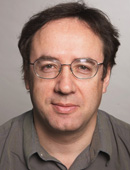Biography
Research Topics
Biochemistry, Brain, Cell Biology, Cell Motility, Cellular Differentiation, Cytoskeleton, Developmental Biology, Developmental Neurobiology, Epithelial Cells, Gene Expressions, Gene Regulation, Genetics, Growth Factors and Receptors, Image Analysis, Microtubules, Migration, Molecular Biology, Morphogenesis, Neurobiology, Notch Signaling, Nucleus, Protein Complexes, Protein Kinases, Protein Trafficking & Sorting, Proteomics, Receptors, Signal Transduction, Stem Cells, Trafficking, Transcription Factors, Transcriptional Activation and Repression
Biochemistry, Brain, Cell Biology, Cell Motility, Cellular Differentiation, Cytoskeleton, Developmental Biology, Developmental Neurobiology, Epithelial Cells, Gene Expressions, Gene Regulation, Genetics, Growth Factors and Receptors, Image Analysis, Microtubules, Migration, Molecular Biology, Morphogenesis, Neurobiology, Notch Signaling, Nucleus, Protein Complexes, Protein Kinases, Protein Trafficking & Sorting, Proteomics, Receptors, Signal Transduction, Stem Cells, Trafficking, Transcription Factors, Transcriptional Activation and Repression
Multi-Disciplinary Training Area
Cancer Biology [CAB], Development Regeneration and Stem Cells [DRS], Neuroscience [NEU]
Cancer Biology [CAB], Development Regeneration and Stem Cells [DRS], Neuroscience [NEU]
